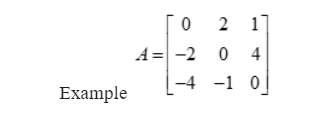Table of Contents
Introduction to skew symmetric matrices
A skew-symmetric matrix is a form of square matrix whose transpose equals the original matrix’s negation. In other terms, n x n matrix A is skew-symmetric if AT = -A. As a result, the matrix’s primary diagonal members are all zeros, and it has rotational or reflectional symmetry.
Definition of Skew symmetric matrix
A skew-symmetric matrix is a square matrix whose transpose equals the matrix’s negation. Mathematically, a n x n matrix A is skew-symmetric if AT = -A. In other words, the items below the main diagonal are the inverses of the equivalent elements above the main diagonal, and the main diagonal elements are all zeros..
Examples for skew symmetric matrices:
Skew-symmetric matrices exhibit a number of intriguing characteristics. A skew-symmetric matrix’s major diagonal, for example, is made up of zeros, while the members symmetrically positioned with respect to the main diagonal have opposite signs.

Properties of skew symmetric matrix
Here are the properties of a skew-symmetric matrix:
- A skew-symmetric matrix is always a square matrix, i.e., it has the same number of rows and columns.
- The main diagonal of a skew-symmetric matrix consists of all zeros (diagonal elements are zeros).
- The elements symmetrically located with respect to the main diagonal have opposite signs. In other words, if A[i, j] is an element, then A[j, i] = -A[i, j].
- The sum of a skew-symmetric matrix and its transpose is always a matrix with all zero elements.
- The scalar multiples of a skew-symmetric matrix also preserve its skew-symmetric property. If A is skew-symmetric and k is a scalar, then kA is also skew-symmetric.
- The determinant of a skew-symmetric matrix is zero if the matrix is of odd order. For matrices of even order, the determinant is a product of negative squares of the eigenvalues.
- Skew-symmetric matrices arise frequently in problems involving cross products and angular velocities in physics and engineering.
- The set of all skew-symmetric matrices of a given size forms a vector space.
- The product of two skew-symmetric matrices is not necessarily skew-symmetric. In general, the product of two skew-symmetric matrices is symmetric.
These properties make skew-symmetric matrices interesting and useful in various mathematical and engineering applications.
Determinant of skew symmetric matrix
Any skew-symmetric matrix of odd order has a determinant that is always zero. This feature is specific to skew-symmetric matrices and holds true for all odd-sized square matrices with members with opposing signs symmetrically opposed to the major diagonal.
he determinant of a skew-symmetric matrix of even order (an even number of rows and columns) is always a perfect square.
Eigen values of skew symmetric matrix
- A skew-symmetric matrix’s eigenvalues are always totally imaginary or zero.
- The eigenvalues of a skew-symmetric matrix A are given by = bi, where “b” is a non-zero real integer and “i” is the imaginary unit (i.e., the square root of -1).
- If the skew-symmetric matrix has an odd order, it will always have at least one eigenvalue equal to zero, and the remaining eigenvalues will be complex conjugates (i.e., bi).
- If the skew-symmetric matrix has an even order, all of the eigenvalues are purely imaginary and arrive in pairs of complex conjugates (i.e., bi).
In summary, skew-symmetric matrix eigenvalues always take the form = bi, where “b” is a non-zero real integer.
Also Check Relevant Topic:








